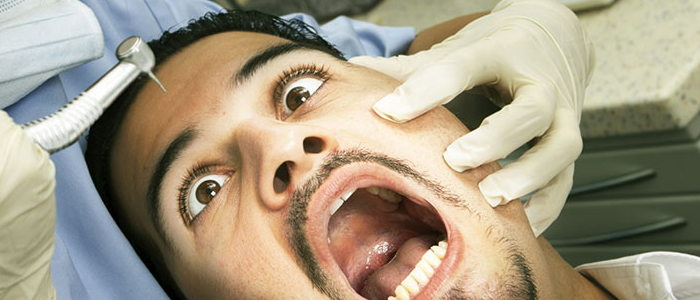Dental phobia is a problem that affects millions of people all over the world. Nevertheless, those concerned often feel as if they are alone in their anguish and have no one to turn to. This of course isn’t the case at all, but dental phobia can still be very lonely and life-affecting to say the least.
Every day, experts are approached by those with dental phobia with a variety of questions and concerns. Some of which being crucially important to help those who suffer from dental phobia come to terms with their fear and anxiety. Given that there’s no silver-bullet solution to dental phobia, it is important to tackle the issue proactively, rather than simply ignoring it.
So with this in mind, what follows is a brief overview of a selection of questions regarding dental phobia and their respective answers:
QUESTION
Where can I find a dentist that understands and acknowledges dental phobia?
ANSWER:
First and foremost, there are plenty of dentists in business today who specialise quite specifically in the treatment of nervous patients. Make no mistake about it – the attitude, experience and capabilities of the dentist you choose can make all the difference. Carry out plenty of research online before making your decision, while also seeking recommendations from other nervous patients.
QUESTION
What should I do if I genuinely feel too terrified to go to the dentist?
ANSWER:
Unfortunately, the worst thing anyone with a dental phobia can do is avoid going to the dentist entirely. The reason being that the longer you leave it, the more likely you are to develop the kinds of problems that could prove difficult, expensive and unpleasant to address. By contrast, attending the dentist on a regular basis means avoiding advanced problems by preventing their occurrence in the first place. Rather than seeing dental phobia as a reason to never visit the dentist, adopt a proactive approach and focus on preventative measures.
QUESTION
Is it not inevitable that the dental treatment I require will be painful?
ANSWER:
Contrary to popular belief, most dental procedures are not in fact painful at all. Particularly these days, given the way in which so many advances have been made in both the relevant technology and the procedures themselves. Not only are the pain relieving techniques used by dentists these days so much more effective than they have ever been, but so too are the methods of administering them. Whereas injections may have been somewhat painful in the past, there are now comparatively painless alternatives such as the ‘wand’. And of course, various options are available for sedation, meaning you won’t be aware of a thing and therefore won’t feel any pain whatsoever.
QUESTION
What are the reasons people develop these kinds of phobias in the first place?
ANSWER:
The interesting thing is that in many instances, there is no specific or identifiable single cause for a case of dental phobia. These are the kinds of psychological issues that can manifest at any time during life – sometimes with an obvious cause, others quite to the contrary. For some people, it’s a case of associating dentists with traumatic past experiences. For others, it’s simply that they have heard terrifying stories from other people and have developed their own fears accordingly. And then there are those who are simply embarrassed about their current oral health, or believe that they’ll need so many painful and unpleasant procedures it’s best to just avoid dentists at all costs. But regardless of the cause, dental phobia has the potential to be equally debilitating and life-affecting in all instances.
QUESTION
What can I do to help prepare myself for upcoming treatment?
ANSWER:
In the run up to any given dental procedure or surgery, the worst thing you can do is simply sweep the issue to one side. But at the same time, you also don’t want to spend too much time dwelling on it. Instead, pay a visit to your dentist as many times as necessary before the appointment, in order to chat with them casually and openly about procedure. Find out as much as you can about what will happen, familiarise yourself with the dentist’s surgery and try to develop a good sense of trust with the dentist. This way, you will probably find that things aren’t nearly as scary when the day arrives as they would be otherwise.
QUESTION
How can I help myself relax during a trip to the dentist?
ANSWER:
Once again, one of the best things you can do is to get to know your dentist and the rest of the staff who work at the clinic at a more personal level. Much of the fear stems from the fact that as you do not know the dentist and they do not know you, you feel as if they cannot possibly understand what you are feeling or what you are going through. Which in turn is guaranteed to make any anxiety or apprehension you have significantly worse. By contrast, just as soon as you believe that your dentist fully understands the situation you are in, you will find it so much easier to relax during routine check-ups and surgery alike.
QUESTION
What can I do to minimise the likelihood of needing dental surgery in the first place?
ANSWER:
Last but not least, the best thing anyone can do to avoid the likelihood of requiring dental treatment is to keep your teeth and gums in the best possible condition at all times. Invest in a professional electric toothbrush recommended by dentists, use a high-quality fluoride mouthwash and make sensible dietary choices at all times. In addition, as already mentioned, you should also ensure that you visit your dentist at least once every six months for a routine inspection of your overall oral health. The better care you take of your oral health and hygiene in general, the less likely you are to need any unpleasant or expensive treatment in the near future at least.
